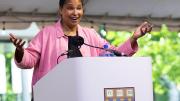Conant University professor Danielle S. Allen grew up in a large, “politically committed” extended family in 1970s Southern California. “Almost as if with mother’s milk,” she told an audience at the Graduate School of Design’s Class Day, “we took in the lesson from W.E.B. DuBois, Ph.D. 1895, about democracy, about ballot. DuBois said: What can save us from a second slavery but the ballot? Democracy is that fundamental.”
Allen, a widely known political theorist and author of Our Declaration (2014), focuses on questions of citizenship, equity, political engagement, and reforms for democracy. Such discourse comes naturally; political discussions, even sometimes heated, were integral to family life. One year, she recalled, her aunt was on the Congressional ballot in the Bay Area, running for the far-left Peace and Freedom Party, and her father was campaigning for a seat in the U.S. Senate as a “Reagan conservative.” They agreed on the goal: empowerment across communities, thriving health and opportunities for all. But, “boy, were those some dinner conversations,” she laughed. “They went at it—but never breaking the bond of love. Never breaking the bond of mutual respect; that commitment to each other as human beings. That’s the lesson I took in me deep in my childhood about what democracy can give. That space for contest, to have those hard fights, and to try to find that path to empowerment for everybody.”
Allen took her own plunge into electoral politics, launching a campaign for Massachusetts governor in 2021. She bowed out earlier this year, however, and has returned to full duties at Harvard, where she is also director of the Edmond J. Safra Center for Ethics, and leader of The Democratic Knowledge Project. But that frontline experience, and her scholarly research, has sharpened a sense of the dramatic shift that’s taken place in America over the last half-century: “In that time we have had what I call the ‘great pulling apart.’” A massive increase in income and wealth inequality and rise in incarceration rates, an acceleration of the climate crisis, she said, and globalization followed by “de-globalization.” Such divides have echoed among her own generation of cousins. Some have been “lifted up by the elevator of opportunity,” while one fell into substance abuse and another damaged by an unjust police beating. Her youngest cousin served 12 years (starting at age 15) for an attempted carjacking during a time when California’s laws were especially punishing. He got out, enjoyed two years of freedom, she said, but was then shot to death by someone he’d met behind bars.
That 2009 event was a turning point. It’s when Allen began digging into questions of how “in this country we can steer our institutions to achieve the kinds of reforms that would open up opportunity for communities of all kinds,” she said, “put a foundation for flourishing back underneath everybody. And the truth is, I got more and more frustrated as our politics got more and more complicated and more and more polarized and more and more difficult.” Her bid for office, in part, grew out of that sense of mission. She called for a renewed social contract, and vowed to rebuild the foundational aspects of strong social infrastructure: housing, schools, and transportation—voicing support for the development of the East-West commuter rail line that would link Boston to Worcester and Springfield. In an unusual step for novice candidates, she proposed decriminalizing non-violent drug-possession offenses (that involved small amounts of controlled substances) and ramping up addiction/recovery services.
“Why is it exactly that things are so crazy, so complicated, so messy in this country right now?” she asked. “The short answer is: Facebook broke democracy. They didn’t mean to, it was definitely an accident, but they definitely did.” Explaining this, she pointed to the founding of the nation as “an experiment of design.” In the 1780s “the problem that the country faced,” she continued, “was that they could not get a functioning banking system. They could not pass a budget in Congress. They did not have a quorum…they could not make decisions. It was a broken thing.” Out of those problems came a solution: the Constitutional Convention. “It was a design solution to the problems of a community of people who could not actually get anything done together…and they had all kinds of problems of tribalism, factionalism, and division, just as we do now.” James Madison, in arguing for the Constitution, for a representational government, was clear that in a growing country, where people would increasingly spread out across the land, that “people with extreme views would not be able to find each other,” she said. “The idea was that because of geographic dispersal, in order to get your views in the public sphere you would have to go through a representative. Geography was a forcing factor to make a system of representative government work.”
But that doesn’t exist anymore. “An actual premise of the Constitution was knocked out by social media. So that’s what I mean when I say that ‘Facebook broke democracy,’” she said. “That means we have a very significant design problem facing us right now in any country that wants to organize a structure of self-government. We have a crisis of representation.”
Designers are needed to employ tools of technology and machine-learning to help people be more productive and come together, to help shape public spaces where cross-sections of communities gather to see each other, and learn from each other. Designers help to create new ideas that open up ways people can “articulate their needs,” she added, “and participate in the design process.”
“I have to admit,” she concluded, “I’m a Commencement junkie. I love Commencement because this is where hope is.”








